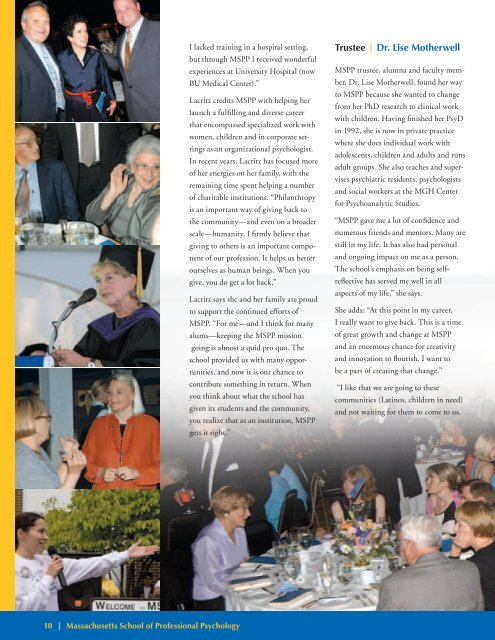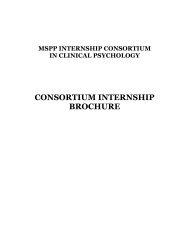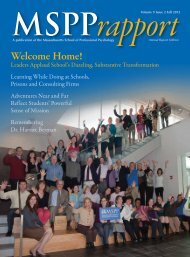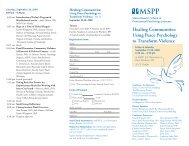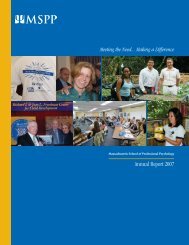College - Massachusetts School of Professional Psychology
College - Massachusetts School of Professional Psychology
College - Massachusetts School of Professional Psychology
Create successful ePaper yourself
Turn your PDF publications into a flip-book with our unique Google optimized e-Paper software.
I lacked training in a hospital setting,<br />
but through MSPP I received wonderful<br />
experiences at University Hospital (now<br />
BU Medical Center).”<br />
Lacritz credits MSPP with helping her<br />
launch a fulfilling and diverse career<br />
that encompassed specialized work with<br />
women, children and in corporate set-<br />
tings as an organizational psychologist.<br />
In recent years, Lacritz has focused more<br />
<strong>of</strong> her energies on her family, with the<br />
remaining time spent helping a number<br />
<strong>of</strong> charitable institutions. “Philanthropy<br />
is an important way <strong>of</strong> giving back to<br />
the community—and even on a broader<br />
scale—humanity. I firmly believe that<br />
giving to others is an important compo-<br />
nent <strong>of</strong> our pr<strong>of</strong>ession. It helps us better<br />
ourselves as human beings. When you<br />
give, you do get a lot back.”<br />
Lacritz says she and her family are proud<br />
to support the continued efforts <strong>of</strong><br />
MSPP. “For me—and I think for many<br />
alums—keeping the MSPP mission<br />
going is almost a quid pro quo. The<br />
school provided us with many oppor-<br />
tunities, and now it is our chance to<br />
contribute something in return. When<br />
you think about what the school has<br />
given its students and the community,<br />
you realize that as an institution, MSPP<br />
gets it right.”<br />
Trustee | Dr. Lise Motherwell<br />
MSPP trustee, alumna and faculty mem-<br />
ber, Dr. Lise Motherwell, found her way<br />
to MSPP because she wanted to change<br />
from her PhD research to clinical work<br />
with children. Having finished her PsyD<br />
in 1992, she is now in private practice<br />
where she does individual work with<br />
adolescents, children and adults and runs<br />
adult groups. She also teaches and super-<br />
vises psychiatric residents, psychologists<br />
and social workers at the MGH Center<br />
for Psychoanalytic Studies.<br />
“MSPP gave me a lot <strong>of</strong> confidence and<br />
numerous friends and mentors. Many are<br />
still in my life. It has also had personal<br />
and ongoing impact on me as a person.<br />
The school’s emphasis on being self-<br />
reflective has served me well in all<br />
aspects <strong>of</strong> my life,” she says.<br />
She adds: “At this point in my career,<br />
I really want to give back. This is a time<br />
<strong>of</strong> great growth and change at MSPP<br />
and an enormous chance for creativity<br />
and innovation to flourish. I want to<br />
be a part <strong>of</strong> creating that change.”<br />
“I like that we are going to these<br />
communities (Latinos, children in need)<br />
and not waiting for them to come to us.<br />
In the past, psychotherapy has been for<br />
the privileged. MSPP is reaching out to<br />
those who have been disenfranchised.<br />
We want to speak their languages and<br />
tailor care to their needs. All this reso-<br />
nates strongly with me,” she says.<br />
As for her contribution to MSPP:<br />
“I think I can help the board to think<br />
outside the box and still be clear about<br />
the essential mission <strong>of</strong> the school.<br />
I believe my passion for creativity and<br />
excellence can make a difference.”<br />
Trustee | Richard Freedman<br />
Richard (RIF) Freedman, board mem-<br />
ber, long-time business owner (Webster<br />
Spring), and major gifts <strong>of</strong>ficer at Har-<br />
vard <strong>School</strong> <strong>of</strong> Education after “retire-<br />
ment,” sees his trustee role as equally<br />
compelling as Motherwell’s. “I believe<br />
my way <strong>of</strong> contributing to the school is<br />
by sharing my business know-how, my<br />
development experience, and my under-<br />
standing <strong>of</strong> other institutions <strong>of</strong> higher<br />
learning,” he says.<br />
Freedman, whose hard work and counsel<br />
to keep MSPP financially sound spans<br />
nearly two decades, believes his loyalty<br />
has been well rewarded. “When<br />
I came on board at Stan Buchin’s<br />
request, I knew nothing about the<br />
<strong>Massachusetts</strong> <strong>School</strong> <strong>of</strong> Pr<strong>of</strong>essional<br />
<strong>Psychology</strong>. Now I have a working<br />
knowledge <strong>of</strong> the field, but more<br />
importantly I have had the privilege <strong>of</strong><br />
knowing and working with pr<strong>of</strong>ession-<br />
als dedicated to the training <strong>of</strong> young<br />
psychologists, who, as we all know, will<br />
impact our world in important ways in<br />
coming years.”<br />
A contributor to MSPP and other non-<br />
pr<strong>of</strong>its over the years, Freedman believes<br />
that philanthropy can have a huge<br />
impact on the life <strong>of</strong> an organization<br />
such as MSPP. “I believe it can make<br />
a big difference in an organization’s<br />
ability to be flexible and creative and to<br />
experiment with new ideas and program-<br />
ming. It also allows a school like MSPP<br />
to widen its base <strong>of</strong> students by provid-<br />
ing scholarships to those who otherwise<br />
could not afford to come.”<br />
Citing the Latino Mental Health and the<br />
<strong>School</strong> <strong>Psychology</strong> programs as examples<br />
<strong>of</strong> this, he adds: “It makes me feel good<br />
to give back to the community, knowing<br />
I can make a real difference.”<br />
Trustee | Dr. James Stellar<br />
Dr. James R. Stellar is dean <strong>of</strong> the<br />
<strong>College</strong> <strong>of</strong> Arts and Sciences at North-<br />
eastern University. He also teaches,<br />
conducts research, and serves as a<br />
trustee <strong>of</strong> MSPP.<br />
Stellar believes in the integrated model<br />
adopted by MSPP—the combining <strong>of</strong><br />
clinical theory with clinical field train-<br />
ing. It is familiar ground, given his work<br />
at Northeastern, an institution that pio-<br />
neered a cooperative system where students<br />
learn by working outside the university in<br />
fields appropriate to their studies.<br />
“For me,” he says, “there have been three<br />
major career challenges: understanding<br />
the nervous system, including research<br />
in combating drug addiction; passing on<br />
knowledge to students; and higher edu-<br />
cation—how to work and learn within,<br />
and outside, a university.”<br />
As a trustee, Stellar’s contributions to<br />
MSPP include strategic planning as well<br />
as providing a sense <strong>of</strong> academic man-<br />
agement. “Regarding MSPP’s future,” he<br />
says, “I want to see MSPP build on the<br />
excellence <strong>of</strong> its accomplishments, and to<br />
carry this out, fundraising is extremely<br />
important, yet with a balance that does not<br />
undermine the core values <strong>of</strong> the school.”<br />
0 | <strong>Massachusetts</strong> <strong>School</strong> <strong>of</strong> Pr<strong>of</strong>essional <strong>Psychology</strong> Annual Report 2005 |


